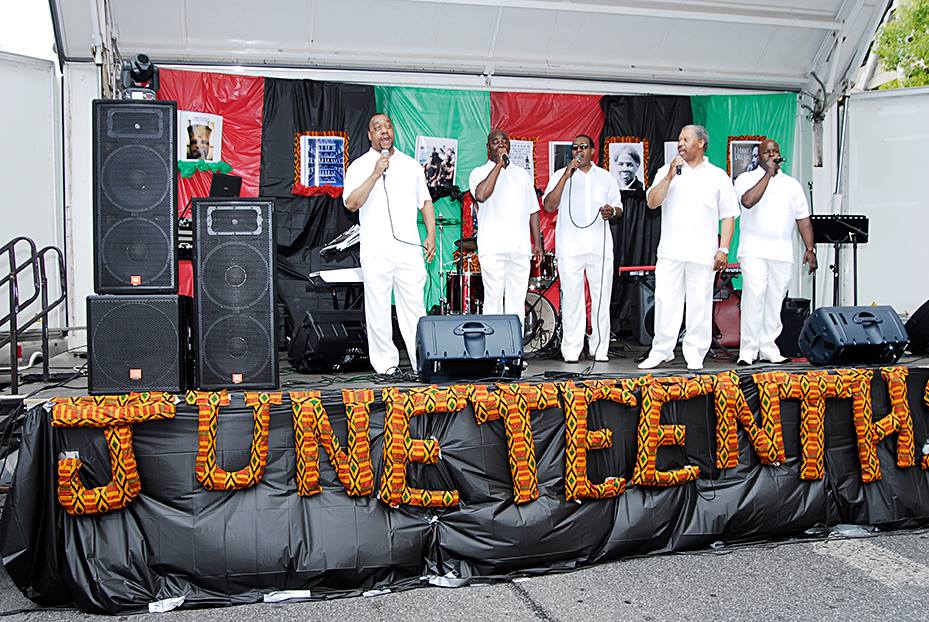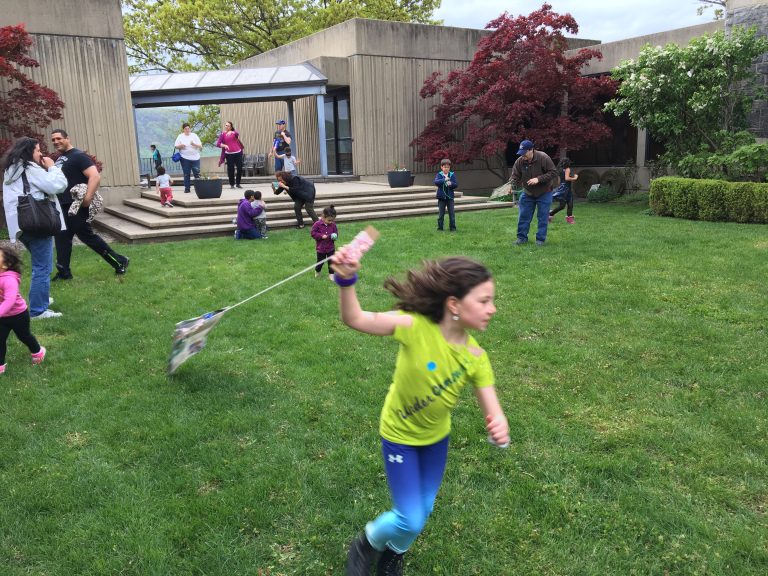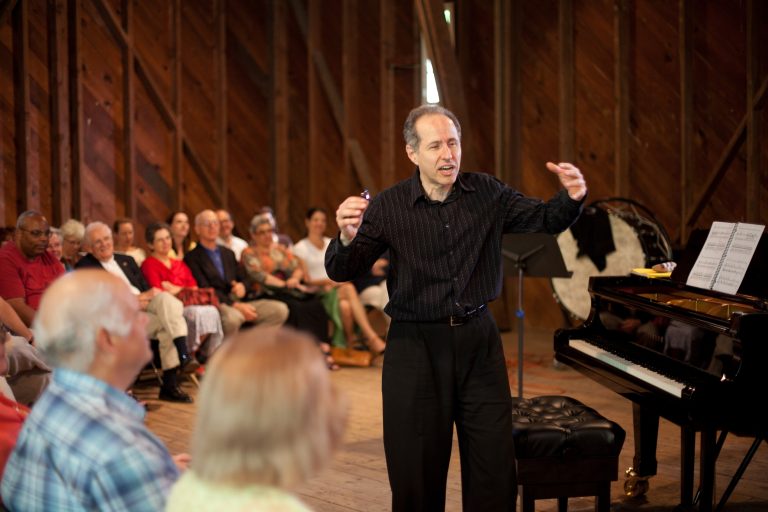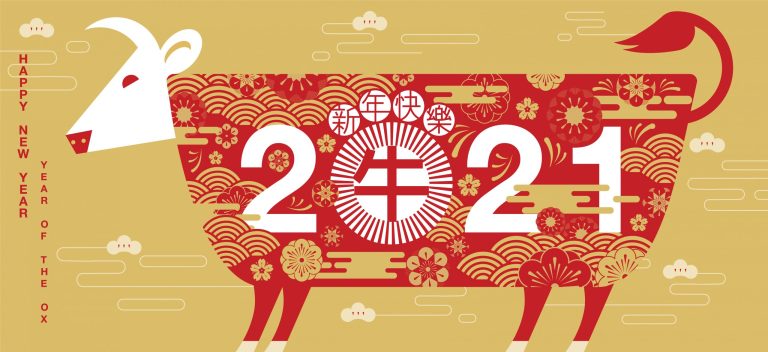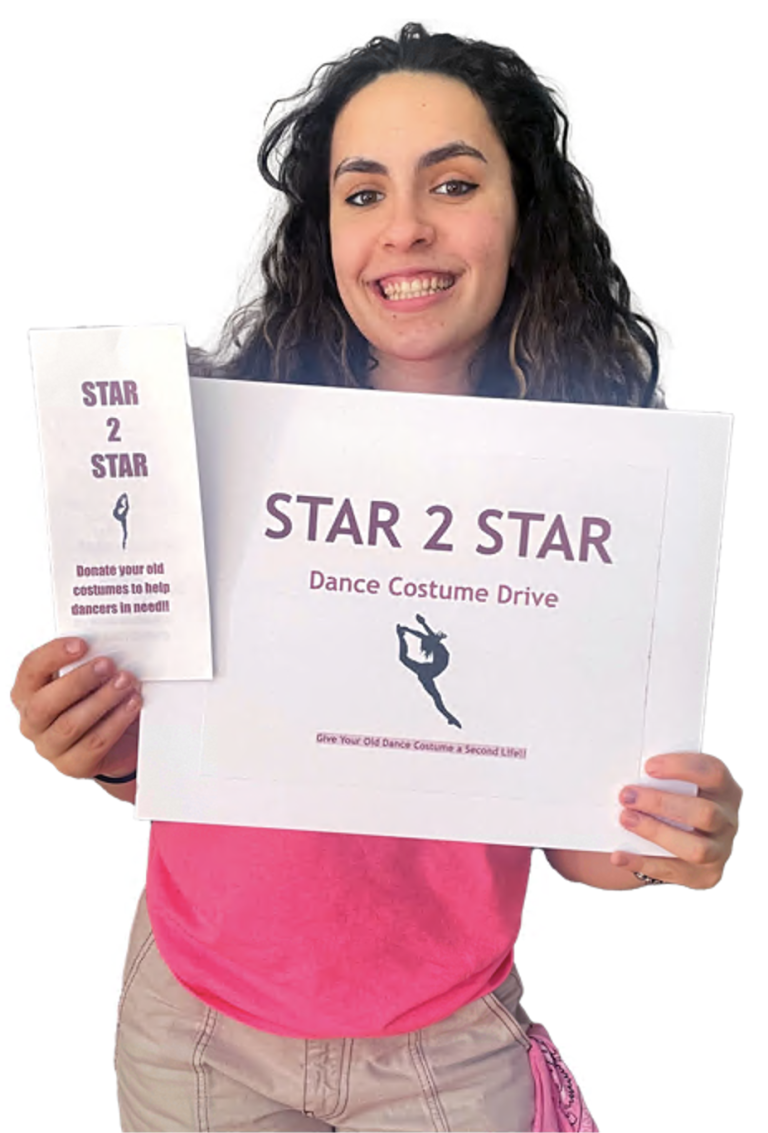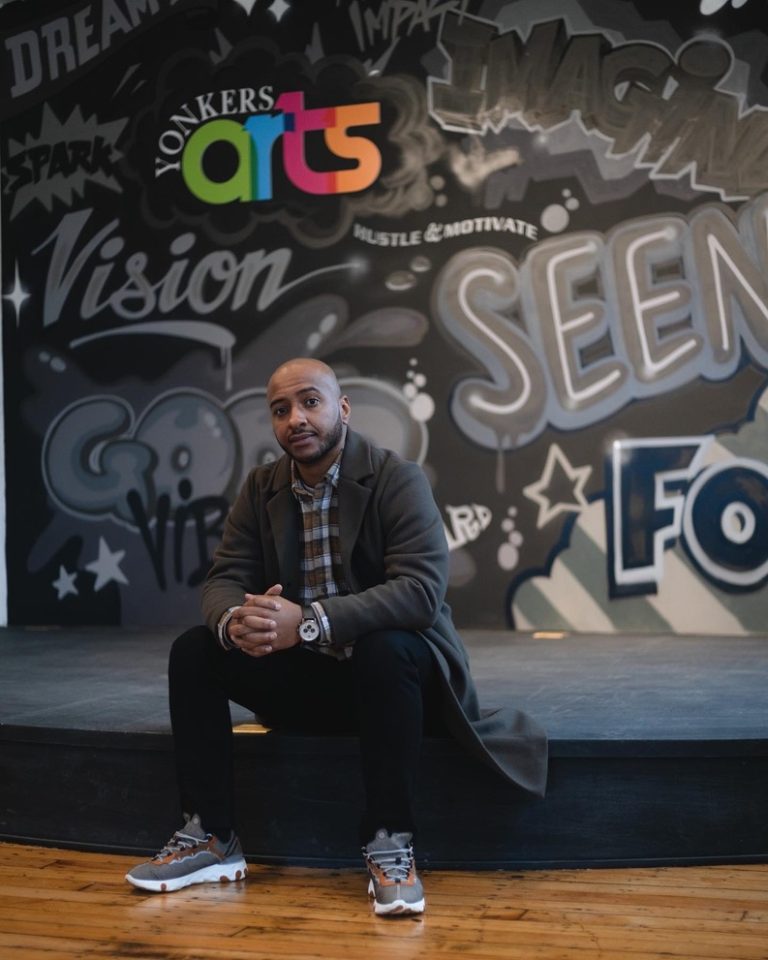Celebrating Juneteenth
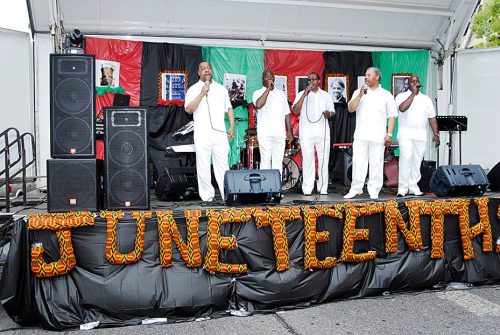
Juneteenth commemorates the declaration that all Black people in Galveston, Texas were “free.” This announcement, made on June 19, 1865, came more than two years after the signing of the Emancipation Proclamation and is considered by Black people in the United States as “Emancipation Day”: The date is celebrated annually to commemorate the end of slavery in the country; however, last year, the State of New York announced that this date would become an official state holiday beginning in 2021. The welcome announcement has prompted additional celebrations and events throughout Westchester County.
The following pages feature excerpts from interviews between ArtsWestchester’s Director of Folk Arts, Aaron Paige, with prominent Juneteenth community leaders in Westchester and Rockland Counties. The interviews highlight the history of these Juneteenth celebrations and their plans for 2021.
For a comprehensive listing of upcoming Juneteenth events, click here!
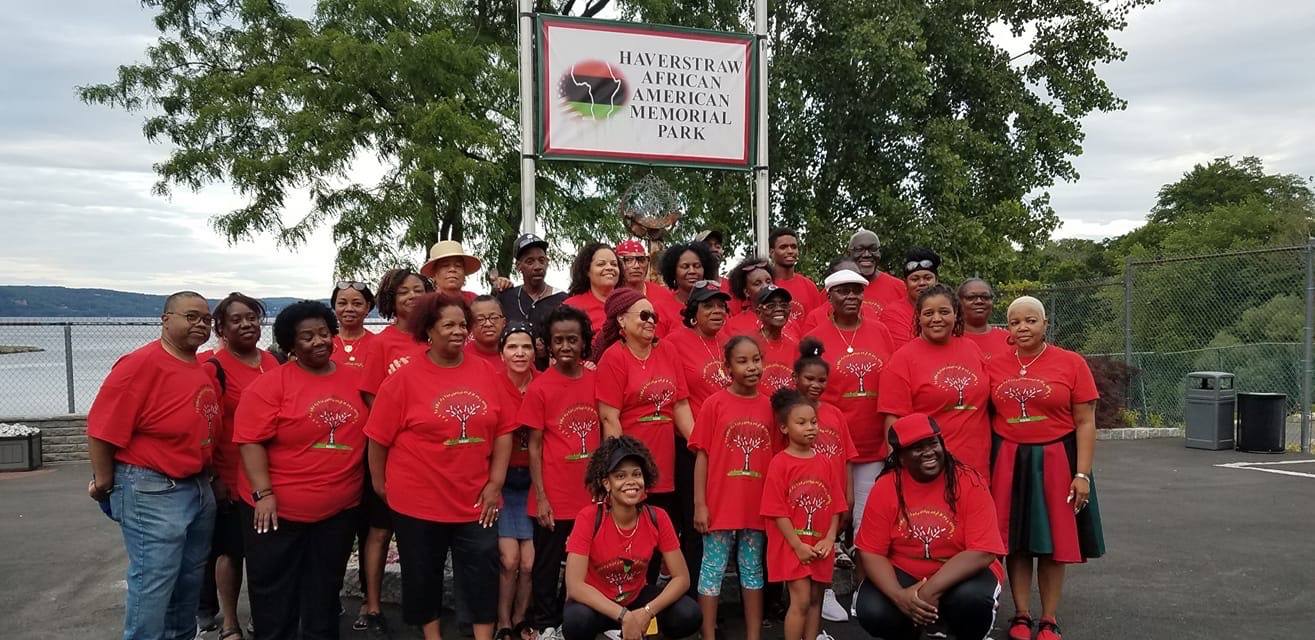
Haverstraw:
Excerpts of an interview with Virginia “Ginny” Norfleet, Founder and Executive Director of the Haverstraw African American Connection
Aaron Paige (AP): What is the origin of Haverstraw African-American Connection and Haverstraw’s Juneteenth celebration?
Ginny Norfleet (GF): We had our first celebration in 2016. Haverstraw was home to 238 slaves… We built a memorial park that would host this history as well as names of all the African-American families, [and we decided to] have a yearly celebration on Juneteenth. We have a rich African-American history, but it was hidden for 400 years… After educating my friends on this history, [we created] the Haverstraw African American Connection, whose mission is to educate about the history of the African-Americans of Haverstraw.
AP: What makes Haverstraw’s Juneteenth celebration unique?
GN: African-American Memorial Park is where the first African-American AME Zion church once stood in Haverstraw in 1846… Today, the ancestors who went unnoticed, unrecognized and whose stories remained untold, are finally being given a platform to hear and tell their story. We also honor Him, the same God that brought Harriet Tubman through, when she couldn’t read and write.
AP: What is the plan for Juneteenth 2021?
GN: We will kick off on June 18. We start down by Village Hall, where we raise a flag and sing Lift Every Voice and Sing. Then we celebrate with a humongous block party – a live band along with DJ Ginny Norfleet (that’s me!). The following day, we have our “real” celebration at 41 Clinton Street… We will feature gospel greats Anointed Friends, Lorraine Stancil, Minister Angel Brooks, and Richard Smith and Friends. This year’s Juneteenth will be even bigger because it’s a state holiday and because the Wesley Wofford statue of Harriet Tubman is currently in Haverstraw.
AP: What does Juneteenth mean to you personally?
GN: You have to understand that this history, and even the story of Juneteenth, is quiet. I was in my fifties when I first heard about Juneteenth. I want to make sure that that same issue would never be a problem for future generations. It should be as well-known as Christmas or Easter, because this is our celebration, celebrating our freedom. It’s for anybody and everybody.
Irvington:
Excerpt from an interview with Kelli Sherelle Scott, Founder of Irvington Juneteenth, Chef Activist and Food Story Teller.
Aaron Paige (AP): Juneteenth in Irvington is one of the more recent annual celebrations in Westchester County. Can you tell me about that?
Kelli Sherelle Scot (KS): Last year, we were going through two pandemics at the same time…when the racial climate in America had flipped upside down… We really felt like it was important to continue the conversation around social justice… I had wanted to do a program around food for Juneteenth [last year]… but I quickly realized, that we needed to do so much more. So we took on the responsibility of Juneteenth as an educational moment…
AP: As a chef and food justice activist, how do you connect food and Juneteenth?
KS: Last year, I [told the] story of the Gullah Geechee people based out of the Carolinas and Georgia… Literal blood, sweat and tears went into the rice that you eat with your meals… These people were left in the middle of islands and if they tried to get away, they would drown… So for Juneteenth, it was important that we partner with local restaurants…to bring business into our local economy. This year, we’re partnering with MP Taverna…and Cravin’ [in Ossining]. Foods tell a story, right?… Any type of expression of art at Juneteenth, whether it be food, painting or jewelry, has a bigger story and it connects us to a deeper place.
AP: What does Juneteenth mean to you personally?
KS: For me, Juneteenth has always been about the overall expression of the Black culture…For example, growing up [in Louisiana], we’d have a bunch of Black vendors that would always come out. And we were able to support artists that were never seen. In Louisiana, Juneteenth was also about hearing from older people…The most important thing was to understand our history and how to move forward to a brighter future.
AP: What is the plan for Juneteenth in Irvington this year?
KS: Last year, it was just two of us planning. This year it’s a whole committee. One of the biggest successes last year was our panel discussion. It led to about six months of work after Juneteenth, where our mayor and myself continued those conversations. The panel discussion will be back this year. We’ll also have music and feature Nkumu Katalay and The Life Long Band Project.
Peekskill
Excerpt from an interview with Tuesday Paige McDonald, Executive Director of City of Peekskill Youth Bureau and Minister of Music at Mount Olivet Baptist Church.
Aaron Paige (AP): What makes Peekskill’s Juneteenth celebration unique?
Tuesday Paige McDonald (TM): The ritual that I love most in our Juneteenth is that we start our celebration in Park Street AME Zion Church. Before our parade starts, we meet there and have prayer and sing the Black national anthem. There is always a leader in the community who takes the time to talk about why we’re here. Almost like a statement of purpose. I love that we start there because of the connection between Park Street AME Zion Church and the Underground Railroad.
AP: What does Juneteenth mean to you, and has its meaning changed over time?
TM: For me, it’s a day that symbolizes the slow march of progress. I’m not one who sits around the table and says that we haven’t made any progress, but I also feel that we have a long struggle ahead to reach equality. Just going back to June 2020, and the uprising with George Floyd…and then you think about Juneteenth coming…. George Floyd’s killing really sparked something in all of us, and for me it made Juneteenth all that more powerful… I’m looking back and I’m saying ‘Wow, how did my ancestors go through this and still be so resilient?’
AP: What do you have planned for 2021?
TM: It’s going to be beautiful and I am really excited… [After] a private outdoor brunch… we are going to go to Peekskill’s Depew Park, where there will be music… spoken word by our youth… a twenty minute play presented by New Era Creative Space… and two food trucks. The field is huge, [so] we’ll be without masks, but social distancing to keep it safe. In the evening, the NAACP is going to do a virtual event, which will give people who may not be gathering in person the opportunity to attend and celebrate Juneteenth.
Yonkers
Excerpt from an interview with Robert Winstead, President of the Yonkers African American Heritage Committee Aaron Paige (AP): What makes the celebration of Juneteenth in Yonkers unique?
Robert Winstead (RW): Having a chance to speak our own narratives. Juneteenth gives us an opportunity to speak and to learn about these authentically…and also we feel it’s important to remember our ancestors. The legacy of redemption, restoring and trying to rebuild your community as well as yourself…that is a narrative not spoken about enough. So during Juneteenth, we look towards music, education, business and see the positive contributions that African people have made in America…. And the journey still continues today… We can still make a connection and understand the continuity between post-Civil War times, the modern civil rights movement and Black Lives Matter.
AP: What are your Juneteenth plans for 2021?
RW: [Our celebration] is three days: June 18-20…We start off with our pan-African flag raising at City Hall on June 18… and present our King and Queen scholarship recipients – students from the high school who are pursuing their education… On June 19, we will be at Trevor Park all day with youth activities like a kickball tournament and basketball workshops, and then our Ujamaa educational symposium, [during which] several businesspeople will lead a panel discussion that focuses on economic development and cooperation. Our Juneteenth youth division, headed by Project Inspire, worked with the Yonkers African-American Heritage Committee on a youth night. They sponsor a talent and award show, and that’s really our highlight for that day.
On Sunday, June 20, we bring together different church organizations to lead the church service. Historically we have two to five different churches present, and they all have their morning service in the park. The church service is followed by the African Healing Circle with drums and dancing. After that, the Juneteenth summer stage opens up with a huge variety of performances featuring comedians, spoken word artists and culminates in a headlining band.
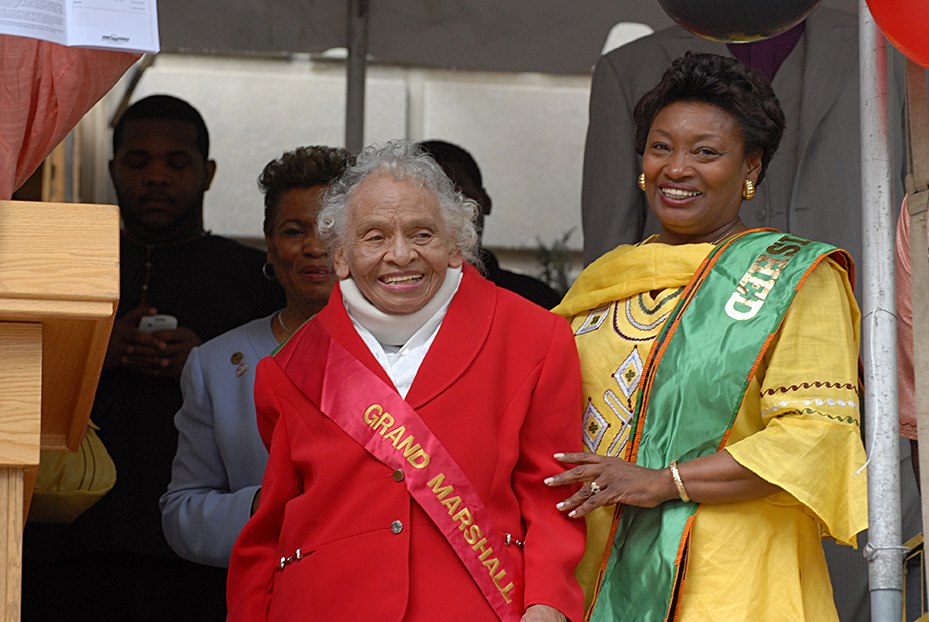
White Plains
Excerpt from an interview with Jonette Mines, President of White Plains Juneteenth Heritage Inc. and Darryl J. Jenkins, Co-Founder of the White Plains Juneteenth Heritage Festival and Parade
Aaron Paige (AP): How did you come to be the first City in Westchester County to organize a Juneteenth celebration?
Darryl J. Jenkins (DJ): We started back in 2004…We wanted to have a legacy for our community and the people of White Plains. We wanted everybody of all races and creeds and color to understand what Juneteenth was really about. It was about creating a legacy and teaching the history.
AP: What do you feel makes the White Plains Juneteenth celebration unique?
Jonette Mines (JM): We were the trailblazers, starting Juneteenth in 2004. It was great to see a diverse group of people, all nationalities coming out to support us and see the parade and the festival and to learn and understand what Juneteenth is all about. For me, it’s about seeing everyone come together, raising the flag for everyone to see, and of course the entertainment.
AP: What significance does Juneteenth have to you personally?
DJ: The important part is the education and the history. A lot of people, Black and White, didn’t know what Juneteenth was about when we started doing this. It was great to see people wanting to know more about Juneteenth… to find out about the history and how it came about. This is a time when people come together, rejoice, have fun and learn at the same time.
AP: What is White Plains Juneteenth Heritage planning for 2021?
JM: We have a virtual event planned for June 12. There will be an ancestral prayer, singing of the negro national anthem and the national anthem, and a performance by jazz vocalist Samara Joy. Heather Miller, Executive Director of the Slater Center and a member of White Plains Juneteenth Heritage, will recite her poem Mama Africa. We will be honoring our Grand Marshall, Wayne Bass, Commissioner of Parks and Recreation for the City of White Plains. We are also going to show footage from past parades and festivals.
A version of this article first appeared in the June issue of ArtsNews, ArtsWestchester’s monthly publication. ArtsNews is distributed throughout Westchester County. A digital copy is also available at artsw.org/artsnews.
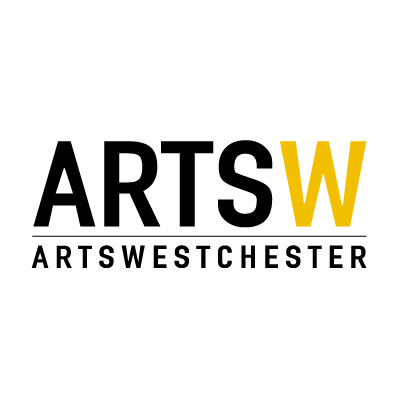
About ArtsWestchester
For more than 50 years, ArtsWestchester has been the community’s connection to the arts. Founded in 1965, it is the largest, private, not-for-profit arts council in New York State. Its mission is to provide leadership, vision, and support, to ensure the availability, accessibility, and diversity of the arts. ArtsWestchester provides programs and services that enrich the lives of everyone in Westchester County. ArtsWestchester helps fund concerts, exhibitions and plays through grants; brings artists into schools and community centers; advocates for the arts; and builds audiences through diverse marketing initiatives. In 1998, ArtsWestchester purchased the nine-story neo-classical bank building at 31 Mamaroneck Avenue which has since been transformed into a multi-use resource for artists, cultural organizations, and the community. A two-story gallery is located on the first floor of ArtsWestchester’s historic building on Mamaroneck Avenue.
For more than 50 years, ArtsWestchester has been the community’s connection to the arts. Founded in 1965, it is the largest, private, not-for-profit arts council in New York State. Its mission is to provide leadership, vision, and support, to ensure the availability, accessibility, and diversity of the arts. ArtsWestchester provides programs and services that enrich the lives of everyone in Westchester County. ArtsWestchester helps fund concerts, exhibitions and plays through grants; brings artists into schools and community centers; advocates for the arts; and builds audiences through diverse marketing initiatives. In 1998, ArtsWestchester purchased the nine-story neo-classical bank building at 31 Mamaroneck Avenue which has since been transformed into a multi-use resource for artists, cultural organizations, and the community. A two-story gallery is located on the first floor of ArtsWestchester’s historic building on Mamaroneck Avenue.

